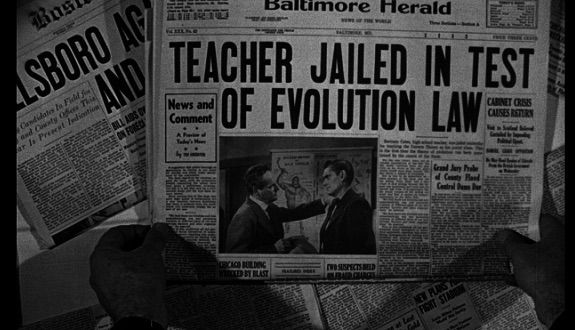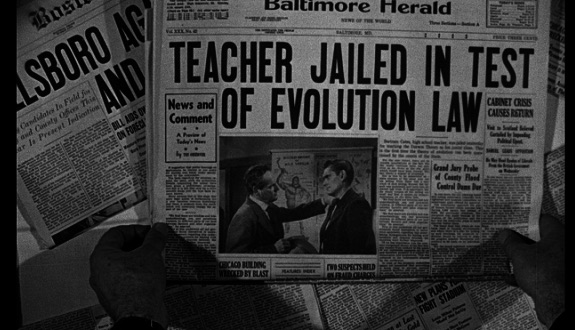The Greatest Lawyer Movies of All Time: Inherit the Wind
- by
- Jun 29, 2016
- Entertainment, Legal Movies
- Reviewed by: Matt Riley


This week, I decided to watch #5 on the ABA’s Top 25, “Inherit the Wind.” That’s a pretty high ranking, placing it in the company of classics like “My Cousin Vinny” and “To Kill a Mockingbird.” Is the movie really that good? Read on to find out…
Inherit the Wind
1960 dir. Stanley Kramer
In 1925, a Tennessee legislator, fearful that schoolchildren were being exposed to unchristian ideas, sponsored a bill that made teaching Darwin’s theory of evolution illegal in public schools. The ACLU offered to support any teacher willing to oppose the ordinance, and a substitute named John Thomas Scopes volunteered. His trial, remembered as the Scopes Monkey Trial, became a national news story when two of the country’s most admired attorneys took up opposing sides of the case. It later became a play, which became a movie, which was called “Inherit the Wind.”
In this fictionalized account, the teacher is named Bert Cates (played by Dick York), and he’s defended by Spencer Tracy as Henry Drummond (standing in for real-life defense attorney Clarence Darrow). At the prosecutor’s table is Matthew Harrison Brady (Fredric March), a fictional version of professional presidential election loser William Jennings Bryan. Along with a cynical newspaper man (Gene Kelly), the town’s zealous reverend (Jeremiah Brown), and a crowd of god-fearing onlookers, Cates, Drummond, and Brady pack into a small rural courthouse to argue the merits of faith v. freethinking. Before the verdict is reached, the lawyers get to showcase their silver tongues and display some serious legal bravado.
So is the movie any good? The short answer is yes. The writing is rich and clear and sometimes lyrical. Spencer Tracy especially gets to deliver some great lines. The movie is also uniformly well acted, and there are plenty of moments for a lawyer movie aficionado like me to appreciate. The drama in the courtroom is well staged, though it sometimes feels a bit stagey. One twist made me roll my eyes, but then I looked it up and it actually happened in real life! So the film delivers as a recreation of a very dramatic and significant case.
But, for me anyway, “Inherit the Wind” is just not an easy movie to get excited about, at least not all these years later. The story is so inherently didactic that it’s hard to feel much of anything about the human beings at its center. They often come across as mouthpieces or archetypes, and when the movie does try to gin up some human-interest subplots – Drummond and Brady are supposed to be old friends, for example, and Cates is engaged to the town reverend’s daughter – it usually loses momentum.
There’s one exception that’s worth noting. After the first day of arguments, the reverend holds a prayer meeting for the town and whips himself into such a hateful frenzy that he has to be cut short by Brady, his ideological ally. “It is possible to be overzealous,” Brady warns, “to destroy that which you hope to save – so that nothing is left but emptiness.” The reverend withers, having emptied himself out, and you feel for him. In moments like these – and there are a few others – the movie comes alive.
By the way, I don’t mean to suggest that every lawyer movie needs to be primarily about people. I loved “12 Angry Men,” for example, not because its characters were so well rounded, but because it so effectively explored questions at the heart of our justice system. Though this, too, is a movie about ideas, none of them are unpacked in a particularly provocative or deep way.
So “Inherit the Wind” will probably not be in my top five if (when!) I chisel into stone the definitive list of the Greatest Lawyer Movies of All Time. But it’s not a bad film by any means, and anyone interested in the landmark 1925 case it’s based on definitely should check it out. It’s currently available to stream on YouTube and Amazon.
Search the Blog

Free LSAT Practice Account
Sign up for a free Blueprint LSAT account and get access to a free trial of the Self-Paced Course and a free practice LSAT with a detailed score report, mind-blowing analytics, and explanatory videos.
Learn More
Popular Posts
-
logic games Game Over: LSAC Says Farewell to Logic Games
-
General LSAT Advice How to Get a 180 on the LSAT
-
Entertainment Revisiting Elle's LSAT Journey from Legally Blonde








